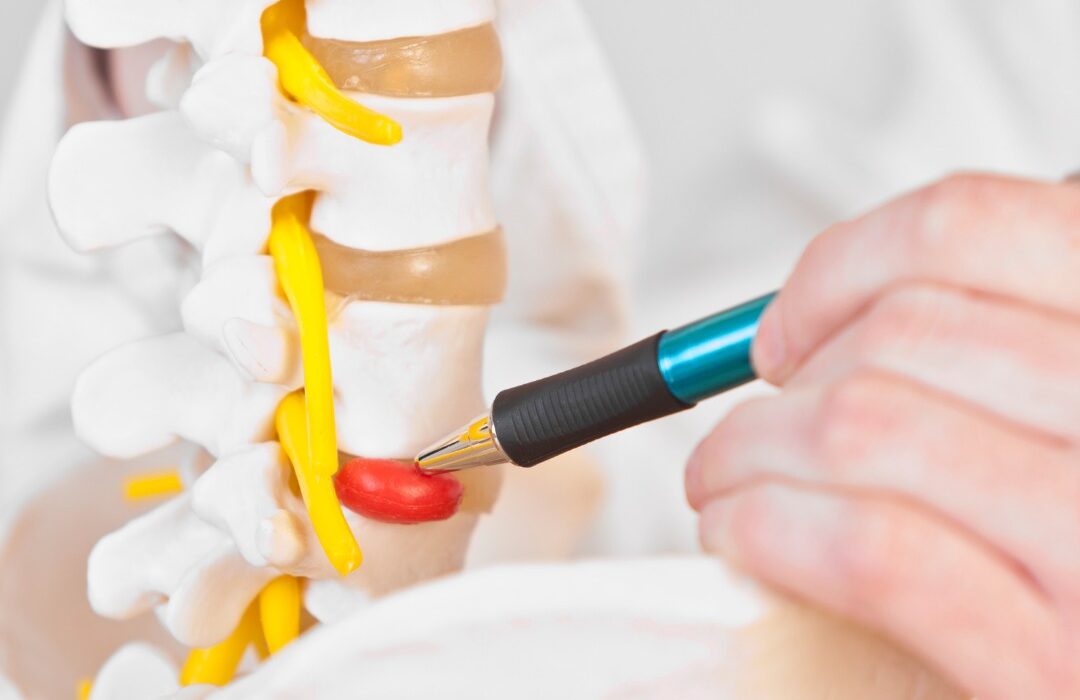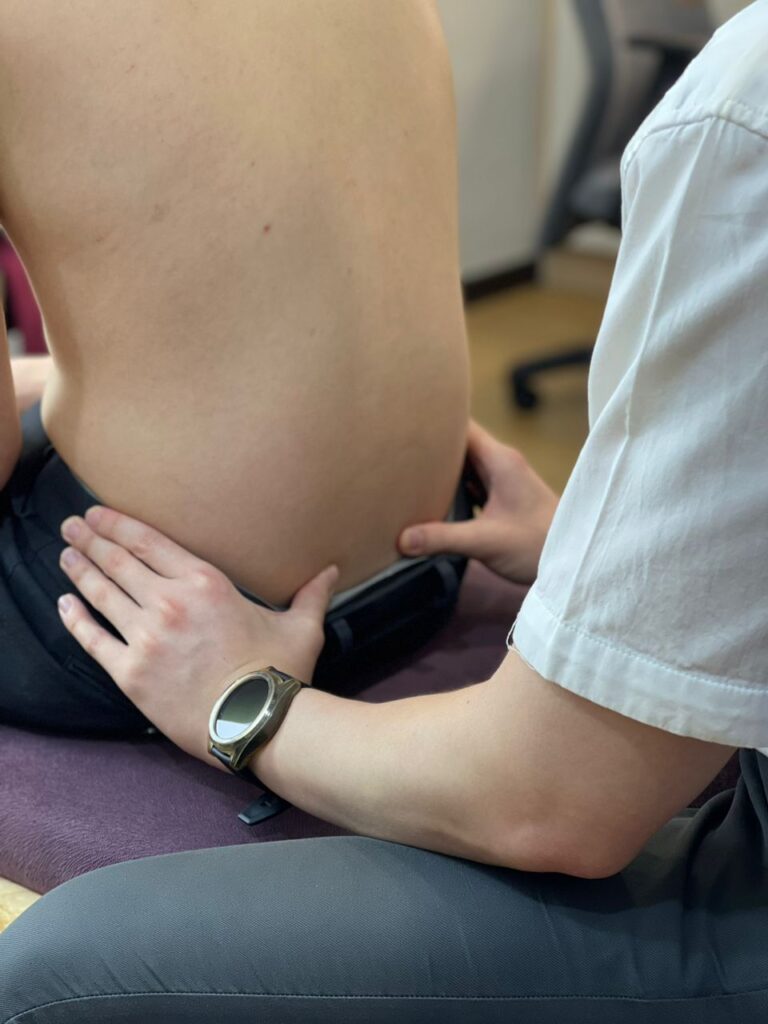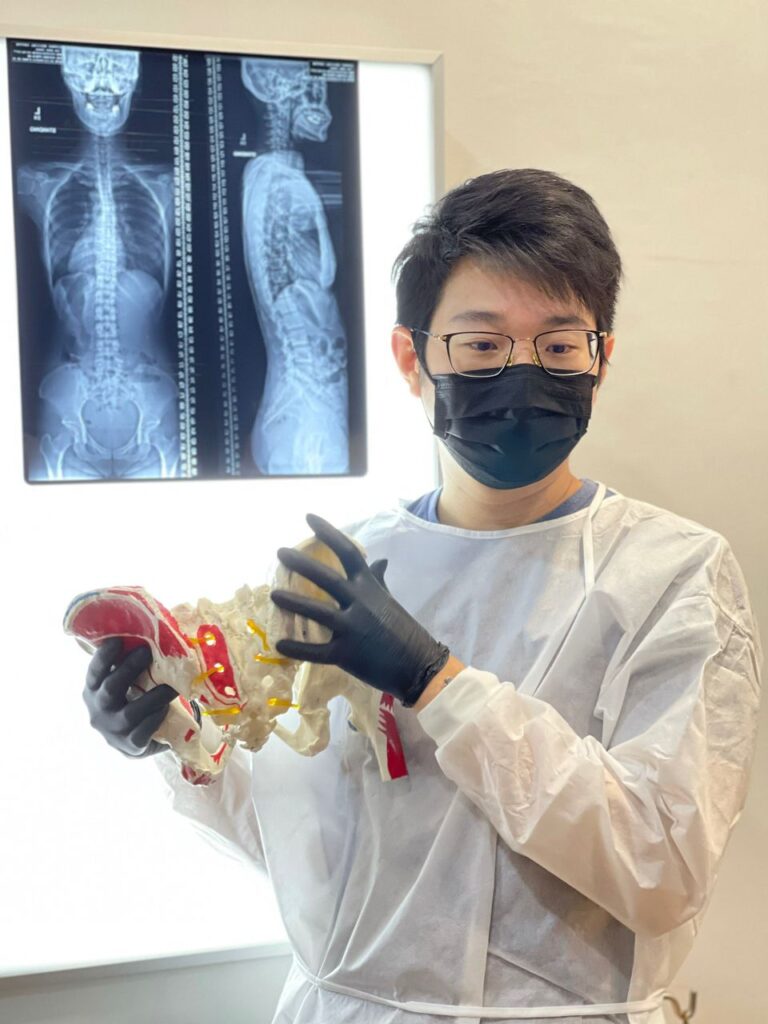Slipped-Disc
Home / Slipped-Disc
A slipped disc, also known as a herniated or prolapsed disc, is a common spinal condition that can cause significant discomfort and mobility issues. Discs are soft, rubbery pads located between the vertebrae in the spine, acting as cushions that absorb shock and allow for flexibility. When a disc becomes damaged, its inner gel-like core can protrude out, pressing on nearby nerves and causing pain.
Symptoms of a Slipped Disc
1. Lower Back Pain
- Description: Persistent pain in the lower back.
- Causes: The slipped disc compresses nerves, causing inflammation and pain.
- Watch For: Pain that worsens with movement or after long periods of sitting or standing.
2. Pain Radiating to the Extremities
- Description: Sharp, shooting pain that radiates down the buttocks, thighs, and legs (sciatica) or to the shoulders and arms.
- Causes: The disc pressing on the sciatic nerve or other nerves.
- Watch For: Pain that follows the path of the affected nerve.
3. Numbness or Tingling
- Description: A sensation of pins and needles or a loss of feeling in the affected areas.
- Causes: Nerve compression leads to disrupted signals.
- Watch For: Persistent numbness or tingling in the legs, feet, arms, or hands.
4. Muscle Weakness
- Description: Weakness in muscles served by affected nerves.
- Causes: Nerve compression interrupts muscle control signals.
- Watch For: Difficulty lifting objects, holding items, or walking properly.
5. Worsening Pain with Certain Movements
- Description: Pain intensifies with specific actions such as bending, lifting, or twisting.
- Causes: These movements increase pressure on the slipped disc.
- Watch For: Identifying specific movements that trigger or worsen pain.
6. Loss of Bladder or Bowel Control
- Description: Difficulty controlling bladder or bowel functions.
- Causes: Severe nerve compression affecting the sacral nerves.
- Watch For: Immediate medical attention required for these symptoms.
7. Increased Pain at Night
- Description: Pain that becomes more intense during the night.
- Causes: Lying down may increase pressure on the disc.
- Watch For: Pain that disrupts sleep or prevents comfortable rest.
Chiropractic’s Approach Towards Slipped-Disc Treatment
Chiropractic care offers a non-invasive, drug-free approach to managing and alleviating the symptoms of a slipped disc. Chiropractors are trained to diagnose and treat musculoskeletal issues, focusing on the spine and its alignment. Here’s how chiropractic care can do for slipped-disc treatment:
- Comprehensive Assessment: Chiropractors conduct thorough evaluations to determine the severity and specific location of the slipped disc. This includes physical examinations, neurological assessments, and imaging studies if necessary.
- Gonstead Chiropractic Adjustments: Gentle, precise adjustments help realign the spine, reducing pressure on the affected disc and nerves. This can alleviate pain, improve mobility, and promote the natural healing process.
- Soft Tissue Therapy: Chiropractors may use trigger point therapy, and myofascial release to reduce muscle tension, improve circulation, and support recovery.
- Rehabilitation Exercises: Tailored exercise programs strengthen the muscles supporting the spine, enhance flexibility, and prevent further disc issues. These exercises are crucial for long-term recovery and maintaining spinal health.
- Lifestyle and Ergonomic Guidance: Chiropractors provide advice on proper posture, ergonomics, and daily activities to minimize strain on the spine. They may also offer tips on nutrition and overall wellness to support healing and prevent recurrence.

Benefits of chiropractic care towards slipped-disc treatment
The formation of a slipped disc involves a combination of degenerative changes, injury, and lifestyle factors that weaken the structure of the intervertebral discs. Understanding these processes can help in the prevention, early detection, and effective treatment of this condition. Chiropractic care, physical therapy, and lifestyle modifications can play a crucial role in managing symptoms and improving spinal health for those affected by a herniated disc.
When people think of a slipped disc, they often focus on the disc itself as the primary culprit. However, several hidden factors can contribute to this condition. Poor posture over long periods can place undue stress on the spine, leading to disc displacement. Weak core muscles may fail to provide adequate support for the spine, increasing the likelihood of a disc slipping. Repetitive strain from activities such as heavy lifting or certain sports can also gradually damage spinal structures. Additionally, lifestyle factors like obesity can exert extra pressure on the spine, making discs more prone to slipping. Genetic predispositions to spinal conditions and age-related wear and tear can further exacerbate these risks. Recognizing and addressing these underlying causes is essential for preventing and managing slipped discs effectively.


